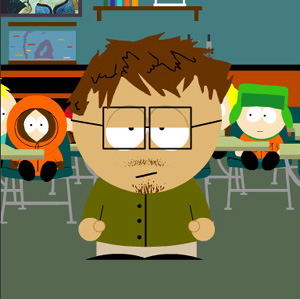
My week is filled primarily with the task of creating a lecture on advanced Web design for JOUR 428/528, and teaching myself enough additional CSS that I sound like an expert in class Friday. I've dabbled in CSS, and I've learned a bit while working on blog layouts, but there's a lot left to learn, reduce, and spit up Friday afternoon. CSS is so beautifully elegant and horribly nauseating at the same time.
But Fun Joel wrote a long post about writing short-film scripts for others to film. Nearmiss and I have written one and are at work on a second, and both look like they will be made. I can add something of value to the scribosphere other than the promotion of chinchillas as pets.
First, and most important, you can write a short for somebody else to film. It happens. But it's not a spec-feature process. Don't bother going from prodco to prodco with a short script. Shorts are made by people, not companies. You need to make contact outside the industry walls with directors who are looking for material.
I've met directors at local screenwriting groups, and some are eager to work with a screenwriter's ideas. These meetings are a good place to set up a local production. Our first short found a producer and a director sort of this way: Nearmiss and I worked on it as part of an exercise at the TriggerStreet online community. Marior, the director, read the logline, asked for the script, and signed on. It really was as simple and easy as it sounds.
Another place to meet people is a film school. You may have a better chance if you're enrolled, although I expect the onus is on you to make your own shorts then. You'll might find a film-school student who's great at directing but lousy at writing. I've met a few. These people are looking for scripts to make. Try going to the film-school office and asking permission to post a notice on the department bulletin board. Or post your sheet of paper on the nearest streetlight.
The last avenue of opportunity I want to discuss is the least useful. Our second short sold because Nearmiss works with a producer. She heard he was looking to make four shorts this year. You won't hear that kind of information unless you work in the environment. Were it not for Nearmiss, that would have passed me by. Unfortunately, filmmakers don't often advertise for short scripts.
Fun Joel also keyed on what makes a successful short: "Great short films are not just shorter versions of feature films."
You have, oh, five to 15 minutes to get a point across in a short. I disagree wih Fun Joel, however: you do have time to get a beginning and a resolution in there. It is possible to work up a minature three-act structure. You don;t have to use a punchline formula. And it is possible to lay out character. If you're good, character oozes out from the background, the action, and the dialogue. In "Time and Space", we have distinct characters who make their marks distinctively.
Have you seen "
Fear of Girls"? It doesn't take long to establish these personalities. Heck, look at their clothes. And the setting. You know these guys almost immediately. The nuances come in time. Look how Doug rolls his eyes as Raymond talks about girls. By the end of this piece, you know exactly who these guys are.
My theory of short scripts is that to be successful, they have to have laser-like focus on one theme. You don't have time to explore.
I remember three shorts I watched at one of the Montreal film festivals last summer. "
Krooli" was entirely in Finnish without subtitles, yet was engrossing. It told the story of a Finnish swimmer who trains her entire life and dreams of competing against her Swedish rival. I didn't understand a word of the film, but it pulled me in. It was also long, at more than 20 minutes. But the focus in "Krooli" is the woman's relationship with swimming. We see everything through that lens.
The second film I recall - not well enough to recall the title - is a story of an older teen sister who runs away from home to move in with her first lover, who obliviously dashes her hopes to pieces. She has to return home, which she can do without losing face because her younger sister has covered for her absence. This is focused on the sisters' relationship, and everything else pivots on that.
The third film I remember was pure comedy without plot. A few German pranksters used street signs and billboards as props. The film was just one shot after another, but it worked. Why? It stuck to that one idea.
My goal in writing a short is to find that one idea and hammer it. Everything else should fall into place. It's worked so far.
Fun Joel asks if writing shorts will help you found a screenwriting career. I can't tell you that yet, but I can tell you that I can now refer to myself as a working screenwriter without feeling guilty.






